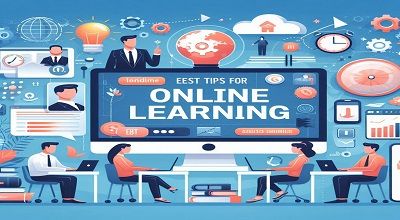Effective Online Learning
Effective online learning refers to the successful acquisition of knowledge and skills through digital platforms and resources. It involves engaging in structured online courses, virtual classrooms, and interactive learning materials to achieve educational goals. Effective online learning requires active participation, self-discipline, time management, and utilizing various online tools to enhance the learning experience. By following best practices such as staying organized, setting goals, engaging with course materials, seeking support when needed, and staying motivated, learners can maximize their online learning outcomes and achieve success in their educational pursuits.
Here are 12 tips for effective online learning:
- Establish a Dedicated Study Environment: Designate a quiet and organized space for learning, free from distractions. This environment should be conducive to concentration and focus.
- Set Clear Goals and Objectives: Define what you aim to achieve through online learning, whether it’s acquiring new skills, completing a course, or advancing your career. Establishing clear goals will help keep you motivated and focused.
- Create a Schedule: Develop a structured study plan that includes specific times for learning activities, such as attending virtual lectures, completing assignments, and reviewing course materials. Consistency and routine are key to effective online learning.
- Actively Participate: Engage actively in online discussions, forums, and virtual classrooms. Participating in interactive activities not only enhances your understanding of the subject matter but also fosters a sense of community and collaboration with fellow learners.
- Practice Time Management: Prioritize tasks and allocate sufficient time for studying, assignments, and self-assessment. Break down larger tasks into smaller, manageable chunks, and set deadlines to stay on track.
- Utilize Available Resources: Take advantage of all the resources provided by your online learning platform, including lecture recordings, reading materials, quizzes, and supplementary resources. Explore additional learning tools and external sources to deepen your understanding of the subject matter.
Read more…
- Stay Organized: Keep track of deadlines, assignments, and course materials using digital calendars, planners, or task management apps. Organize your study materials systematically to facilitate easy access and reference.
- Seek Support When Needed: Don’t hesitate to reach out to instructors, tutors, or classmates if you encounter challenges or need clarification on course content. Most online learning platforms offer various support channels, such as email, discussion forums, and virtual office hours.
- Practice Self-Discipline: Stay disciplined and self-motivated throughout your online learning journey. Minimize distractions, avoid procrastination, and maintain a positive mindset to overcome obstacles and stay focused on your goals.
- Employ Active Learning Techniques: Actively engage with the course material by taking notes, summarizing key concepts, and creating flashcards or concept maps. Apply active learning strategies such as problem-solving, critical thinking, and self-assessment to deepen your understanding and retention of the content.
- Foster Peer Collaboration: Collaborate with peers on group projects, discussions, and study groups. Sharing perspectives, exchanging ideas, and providing feedback can enhance your learning experience and promote a deeper understanding of the subject matter.
- Reflect and Adapt: Regularly reflect on your learning progress, identify areas for improvement, and adjust your study strategies accordingly. Be flexible and open to experimenting with different approaches to optimize your online learning experience.
By incorporating these tips into your online learning routine, you can maximize your effectiveness and achieve your educational goals efficiently.
